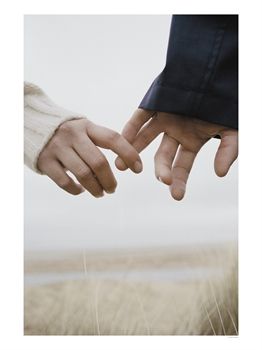
Sometimes I feel like a broken record when it comes to the issues involved with dating a widower. Widowers are men. That means they act and behave like men. And men aren’t that hard to understand. If you start viewing your widower as a man instead of a widower, you’ll be able to quickly identify whether or not they’re ready to date again and, more importantly, are serious about you.
In the hopes that women can better understand widowers, here are five things that will give you some insight into men so you know whether or not they’re ready for a serious, committed relationship.
1. Men can’t be forced into loving someone
For some reason women have this idea they can charm a man into loving them. It doesn’t matter if he’s a widower, divorced, or a bachelor. Women think that somehow they can open a man’s eyes and make them see what a great catch she is.
Here’s the truth: You can’t. When it comes to love, men will figure out rather quickly whether or you’re one they want to spend the rest of their life with. When it comes to widowers, there’s nothing special you can do or say that will make the widower snap out of his grief. If he thinks you’re worth keeping, he’ll do that all on his own.
What you can do is learn how to dress nice, flirt, and learn how to get a man’s attention so he’ll ask you out and get to know you better. Let it be known that Marathon Girl didn’t do anything to help me put the grief for the late wife aside. The first time I saw her I had put my eyes back in my head and pick my jaw off the floor because she was so damn sexy. Then, after I got to know her better, I realized that not only was she hot but she had everything else I wanted in a future spouse. I knew she was the woman I wanted to spend the rest of my life with. I also realized the only way that was going to happen if I moved on with my life. It wasn’t a hard choice. I would have run 100 miles over shards of broken glass just to have her smile at me. After six years of marriage, she has the same affect on me.
And it’s not just me. Over the years I’ve been in touch with lots of widowers who have remarried and they all say the same thing: when the right person comes along, getting over grief is a cinch.
2. Men are, by nature, pursuers
When it comes to relationships, men do better when they’re the one pursing you. If you’re pursing them, you may get a few dates out of it but odds are you’re not going to get a committed relationship from your efforts.
When widowers decide to enter the dating waters after the death of their spouse, they’re often fighting feelings of whether or not they’re ready to date and if they can make room in their heart for another woman. This often makes widower hesitant to take the lead. Women can often sense this hesitancy and tend to take control of the relationship.
Don’t do this. Men need to decide for themselves if you’re worth it. Making this decision for them is only asking for heartache if you perceive the relationship as getting serious. With widowers, having to decide to ask you out or plan a date forces them to come to grips with their internal struggle of whether or not they’re ready to date again and whether or not you’re worth it. (See #1.)
Keep in mind that this applies to the early stages of a relationship where men need to decide if you’re worth it. As the relationship becomes more serious and you become more comfortable with each other, then you can step in. Once they feel like they’ve conquered the relationship and made you the center of their universe, they’ll do whatever you want.
3. Men can only actively love one person at a time
Would you date a man who was still angry over a recent divorce or getting over a breakup with his girlfriend? No? Then why on earth do you date a man who says he’s still grieving his late wife?
Men can only actively love one person at a time. If they still have strong feelings for another person—regardless of whether that person is alive or dead—you’re going to be the rebound relationship. Is that something you really want?
Widowers have to learn how to put their love for the late wife aside and actively love you. This doesn’t mean they stop loving the late wife but it means their utmost thoughts and feelings are for you. Playing second fiddle to an ex-wife or ex-girlfriend is bad enough. It’s even worse when the person is dead.
Avoid men who still clinging to the past. If you don’t, you’re not only in for a roller coaster ride but there’s a broken heart for you at the end.
4. Men’s actions speak louder than their words
Talk is not only cheap, it can be very seductive. Don’t listen to a man’s flattering words. It doesn’t matter how many times a man says he loves you or cares about you. When a guy really loves you, his actions and words will align. Not only will he say you’re the center of his universe, you’ll feel like it too.
Don’t start making excuses for a widower’s behavior because he’s still “grieving.” If he says he’s not giving you the attention, love, and dedication you want because he’s struggling to move on that means 1) he’s not ready for a serious relationship or 2) he’s simply using you for companionship, sex, to fill the hole in his heart, or a combination of the three.
Don’t settle of a second tier relationship. You deserve better. A lot better. Find someone who will treat you like a queen instead of giving you excuses why he can’t make you numero uno.
5. Men don’t equate sex with commitment
My inbox overfloweth with emails from women dating widowers who are dumped soon after sleeping with them. The women generally attribute the widowers’ behavior to some grief related issues and want to know what they can do about it. My answer: nothing.
With men, sex doesn't equal commitment. This goes for single and divorced men and widowers. If the man wasn’t a widower, most women would realized that they had just been used for their bodies. But because he’s a widower and “grieving” most women aren’t quick to what just happened.
You want a committed relationship, get the man to sacrifice for you. Have him prove his love. As Alisa Goodwin Snell, licensed therapist and author of “Dating Game Secrets for Marrying a Good Man” writes:
Sacrifice is deeply connected to love. If you are excessively available, eager to please, quick to meet his needs, and reluctant to express your feelings or needs, you will deny him the opportunity to sacrifice for you. This will turn him off to you and the relationship, due to your lack of faith and trust in him, while also preventing him from developing deep love for you.
If you’re looking for a serious, long term relationship with a guy, zip your legs and wait to see if it's you he wants or sex. If a guy’s looking to use you just for sex, he can only put a seductive façade for so long. Sooner or later the real him will appear. Better to be cautious and make sure the widower is serious about you then to end up with a one night stand and regretting it.
Remember, widowers are men. They act and behave like men. Most widower issues are really man issues. Never the term widower make you think otherwise. Understand men and 99% of any widower-related issues will be solved.
Other widower-related articles by Abel
Up with Grief NEW!
Dating and Marriage: One Regret NEW!
Widowers: They're Still Men! NEW!
10 Dating Tips for Widows and Widowers
Photos of the Dead Wife
5 Signs a Widower is Serious About Your Relationship
How Vice President Joe Biden Dealt with Grief
Life with a Widower
Dating a Widower
The Grief Industry
Suicide Survivor
A Letter to Elizabeth
Sex and Intimacy with Widowers
The Widowerhood Excuse
How to Talk to a Widower
Red Flags to Watch for When Dating A Widower




 I got a brief mention in a Florida Weekly dating column on widowers making the transition to a new relationship and the challenges that come with it. My
I got a brief mention in a Florida Weekly dating column on widowers making the transition to a new relationship and the challenges that come with it. My 
